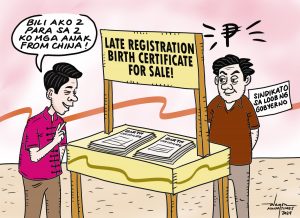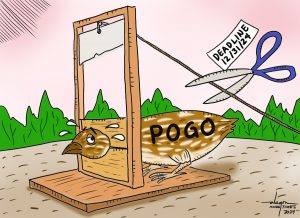By Herman M. Lagon
AMIDST the vibrant Dinagyang festivities, a sad yet crucial conversation unfolded in a youth convo in a small compound in Lapaz, Iloilo City. Prominent figures like Senator Risa Hontiveros, Dean Chel Diokno, and Senator Bam Aquino convened, echoing a sentiment of unease and resistance. Their focus was the burgeoning propaganda for Charter Change (Cha-Cha), a dubious people’s initiative perceived more as a power play than a democratic pursuit.
Sen. Hontiveros articulated a glaring concern: this initiative is not about the people but about greed; it can be transformative, but never this time when the personal agenda and interests of the few trigger it. It is seen as an unconstitutional, treacherous, divisive, and unwise path, fraught with the risk of converting the nation into a veritable ‘Banana Republic,’ as warned by Dean Diokno. Sen. Aquino, for his part, underscored a poignant fear: the loss of democracy’s sacred day when politicians kneel to the people’s voice.
At the heart of this contention is the allegation that Cha-Cha, under the guise of people’s reform but bankrolled by few elites, primarily extends the power of those at the top, particularly in Malacañang and the stamping pads of Congress. Critics argue that this initiative of a small group of people could lead to significant misallocation of resources, political abuse, and a negative impact on national interests. It is a move that might cost the nation a staggering PhP28 billion, money that could otherwise fortify essential services like education, health, and public transportation.
The timing and prioritization of Cha-Cha are equally questioned. The Philippine Constitution, a relatively young document at 36 years, still needs to be fully implemented in parts. Myriads of pressing social issues call for more urgent attention. A common thread emerges: the citizens’ priorities remain firmly grounded in addressing poverty, inflation, education crisis, low wages, unemployment, health issues, drug abuse, crime, corruption, smuggling, and sovereignty concerns, particularly in the West Philippine Sea, which is also considered an economic issue. Yet the political machinery seems more inclined towards a revision of the charter. Charter change, at this juncture, appears disconnected from the real needs and aspirations of the people.
The narrative of Cha-Cha as a tool for the extension of power and the potential transformation into a Banana Republic raises alarms. It suggests a future where the nation’s democratic processes and institutions are weakened in favor of a few. Such a shift could undermine the very essence of the country’s democracy and the principles it stands for.
Former Chief Justice Reynato Puno’s agreement with Sen. Aquino’s concerns about intensified political dynasties and the potential drawbacks of a federal government further deepens the apprehension. The notion that Charter change without public trust and a robust anti-dynasty law would only lead to more entrenched political dynasties and further division is a dire warning.
As we delve into this complex and multi-faceted issue, it becomes clear that the endgame of this so-called people’s, rather politicians’, initiative may not align with the genuine needs and aspirations of the Filipino people. In its current form and intention, the initiative is more about consolidating power and serving the interests of a few greedy people rather than addressing the pressing issues faced, especially by the least, the last, and the lost. It is good that Comelec decided the other day to suspend all People’s Initiative proceedings to make way for reviewing and amendment rules regarding the initiative. But until when will this conditional moratorium be?
The voices from Iloilo City’s Dinagyang conversations with the youth are not just echoes of concern but a clarion call for reflection, action, and vigilance. The path forward for our embattled country should be one where genuine democratic principles are upheld and where the ambitions of a few do not drown out the voices of the many. The true endgame of any political initiative should be the welfare and progress of the people, not the perpetuation of power by those already in control.
***
(Doc H fondly describes himself as a ‘student of and for life’ who, like many others, aspires to a life-giving and why-driven world that is grounded in social justice and the pursuit of happiness. His views herewith do not necessarily reflect those of the institutions he is employed or connected with.)


